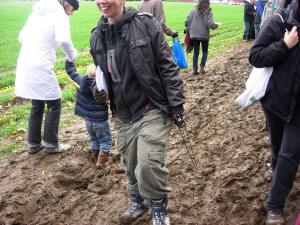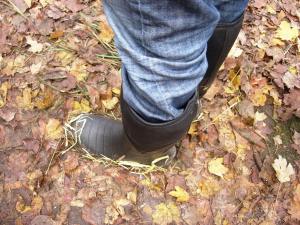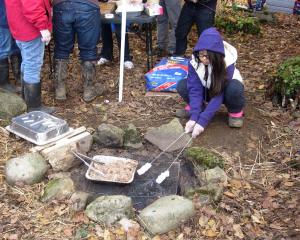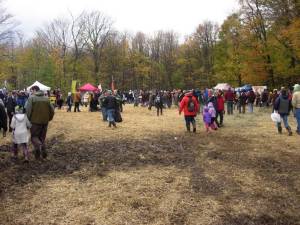
Pages in this Folder:

Related Folders:
See also Department Site Map
Publications:
Market-related videos
Comments?
For the basics, see
- Website & Privacy Policies
- How To Get Involved
- The Role of the Park
Search options:
Department Site Map
Custodians:
Foodstock: An Event in Support of the Movement to Stop the Mega-Quarry, October 16, 2011, Honeywood, Ontario
During the week leading up to Foodstock, I'll admit that my resolve to attend was wavering. 20,000 people, really?? Would it be a freezing cold mudbath? Would there be a hopeless snarl of cars trying to get in? Should I just send along a donation and spend a cozy Sunday at home? Curiosity, concern for the cause, and a sense that something really big might be happening with this event won out, so Sunday morning my husband Jim and I picked up Dufferin bakers Leslie, Heidrun and Jenny and headed up the side roads. The trip went smoothly until a few kilometres from the hosting farms, at which point we slowed to about walking pace for nearly an hour.
Uh oh. A few cars bailed out, likely containing drivers caught by chance and wondering what on earth was going on. Then we climbed the last hill onto a broad plain and saw inching lines of attendees converging from every direction. Wow, much more inspiring than your average traffic jam! When we made it to a parking field that still had room, swarms of smiling volunteers directed us in.
It took a while to grasp just how large and elaborate the setup was: tents for about 80 chef stations spaced along paths at the edge of a forest, many more on tracks winding through the trees, a huge field with a stage, more tents, information booths on the mega-quarry, NDACT's work to oppose it, and the Chefs' Congress, displays on topics such as potato varieties and how brussels sprouts are mechanically harvested, musicians and artists, purposeful atvs, watertanks, cooking fires, sculptures made from deadfalls, fence wire and old rails, first aid and public health teams, lots of homemade signs, and many more smiling and determined volunteers in toques, vests and the essential rubber boots.
Really the day unfolded bite by bite, as we were treated to delicious tastes from the chefs and their energetic teams. Velvet smooth squash soup with candied pecans was my personal favourite, but I particularly liked the "Men with Knives" team staff, who were actually "Children with Tongs". There were lots of chefs in their monogrammed whites, but nothing pretentious going on, just people taking obvious pleasure in feeding people. As the day went on, the lineups at the tents became so long that attendees often lost track of what they were lining up for, and the paths became muddy enough to steal your boots. At one point the blustery fall day took a turn for the worse, and cold rain came down in sheets. A roar went up from the crowd, but the blast passed and good cheer prevailed. As Heidrun said, "People who are fed are friendlier and pretty calm", and the event was exceptionally well organized.
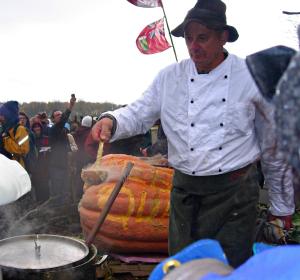
Chef and organizer Michael Statdlander serving soup,
with a giant 'mega-quarry' pumpkin cauldron in the background.
Ayal Dinner of the West End Food Coop reported a conversation with a beet farmer, born and raised on a nearby farm, who was completely amazed at the turnout. He said he knew all his neighbours and everyone in Shelburne, but had hardly seen anyone he recognized yet. As someone used to seeing many familiar faces at 'foodie' events, I felt something similar. Counters put the crowd at close to 30,000. Here was a great antidote to the discouraging rural-urban divide that seemed to be expressed in the provincial election. Something big IS happening, not only in opposition to the quarry, but as Ayal said, in this powerful coming together of city and country people.
Anne Freeman
Related Links: www.ndact.com/
www.canadianchefscongress.com/
Organic Week, October 15-22, 2011
An article by Mathew Holmes, executive director of the Canada Organic Trade Association.
The 100-year diet: making a difference with organic
When you ask people what’s special about organic food, they generally say organic farmers do not use toxic chemical pesticides or synthetic fertilizers, hormones, antibiotics or genetically modified organisms (GMOs). That’s part of the picture, but there is much more to it.
Organic agriculture offers compelling answers to the complex issues facing the world today—whether hunger, land sovereignty, environmental degradation or the threat of GMOs in the food chain.
The organic movement started as farmers, scientists and consumers began to question the long-term legacy of the post-war intensification of chemical agriculture. Sadly, many of these concerns are just as real today as they were back then.
But truly, what can a consumer do about unethical labour practices within the multinational food system; about the prevalence of cancer among farm workers; about the toxic impacts on our environment and wildlife from industrialized agriculture; about the unsustainable use of fossil-fuel-derived synthetic fertilizers which form the basis of modern agriculture; or about the GMOs and countless chemical additives we all eat without knowing it?
It's simple: you can support organic agriculture and help us grow a sustainable and positive alternative.
A lot of people are talking about the "100-mile diet"—about supporting local farmers and local economies. This concept is really important, but it goes both ways: if your local PEI potato farmer is contributing to the toxins in your water that make thousands of fish wash up dead after a major rainfall, this is not a good relationship. If your local meat producer isn't following humane animal welfare standards, what does that say about your community? If your Ontario corn and soy producer is increasing the number of GMOs that are contaminating and compromising the future of food as we know it, why would they deserve your support?
Instead, let's talk about the 100-year diet: about sustainable ecological agriculture that contributes to the resilience of our food system and food security, which increases the biodiversity and balance in our environment, and which contributes to the health and wellbeing of our children and our communities. This is what organic offers that truly sets it apart, and makes it worthy of supporting.
It is time for Canada to re-imagine agriculture as something more than just a major trade that results in food. We need to find a way to bring agriculture, health and environment together—all three are unquestionably linked.
Some governments have already done so: providing incentives for farmers who provide ecological goods and services to their communities and society in general.
In Germany, for example, several water utilities pay farmers to switch to organic methods and certification because it costs less than removing conventional farm chemicals from water supplies. Makes sense, doesn't it? In Italy, the government requires schools to provide children with organic foods to ensure they have the best possible start in life with nutritious food from local farmers.
To make these sorts of changes here at home, it's up to you to "go organic".
When you see the Canada Organic logo on a food label, you know that product meets Canada's national organic requirements, overseen by the Canadian Food Inspection Agency. As organic certification is built on top of all other food regulations and food safety requirements, organic is the most regulated and inspected food system in the country.
But organic is not only that. When you see the Canada Organic logo on a food product, you know that product is from an alternative food system that is supporting farmers and processors who take the long-view of agriculture, health and environment. Choosing organic really does make a difference.


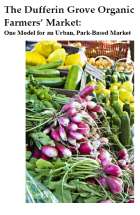
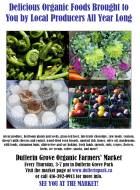

 Printer friendly version
Printer friendly version


